Resume Examples
Discover top resume examples categorized by job title, industry, format, and experience level. Each sample is crafted and endorsed by our team of Certified Professional Resume Writers, ensuring quality and effectiveness.
1000+ Reviews on Trustpilot
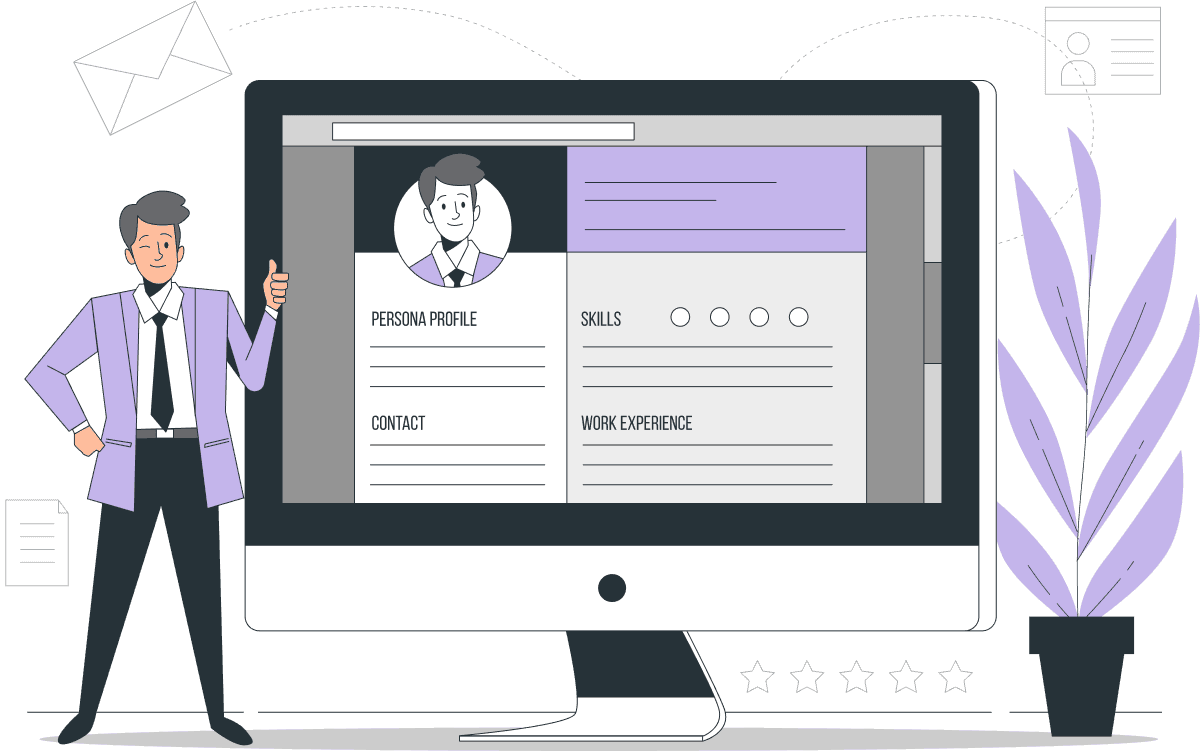
Resume Examples
Discover top resume examples categorized by job title, industry, format, and experience level. Each sample is crafted and endorsed by our team of Certified Professional Resume Writers, ensuring quality and effectiveness.
1000+ Reviews on Trustpilot

Resume Examples
Discover top resume examples categorized by job title, industry, format, and experience level. Each sample is crafted and endorsed by our team of Certified Professional Resume Writers, ensuring quality and effectiveness.
1000+ Reviews on Trustpilot

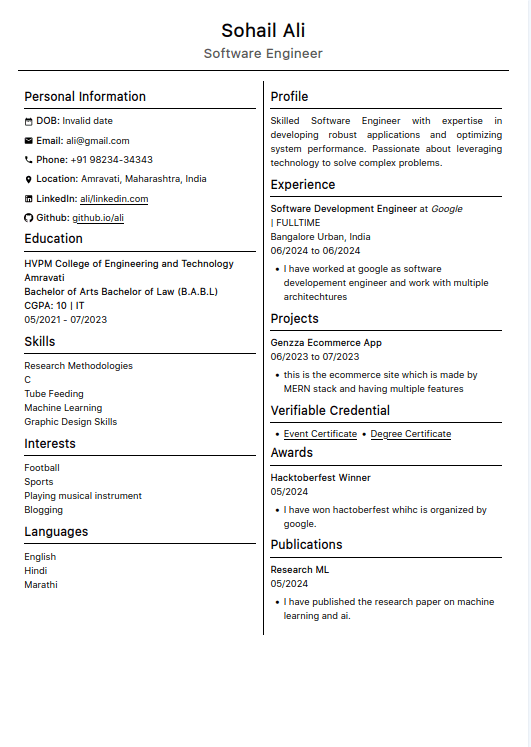
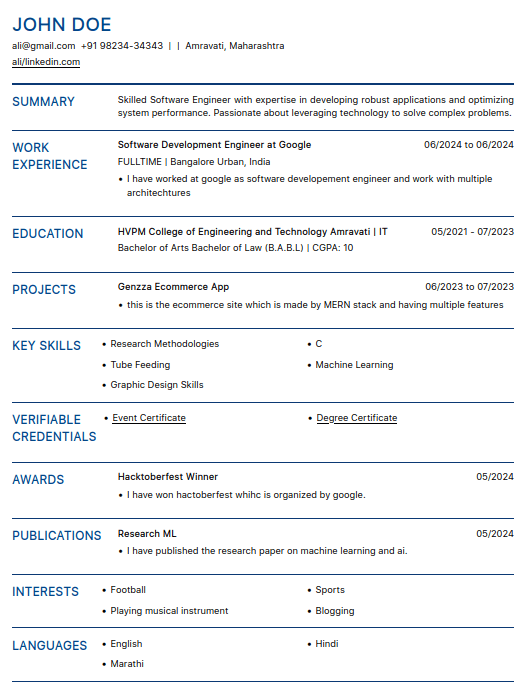
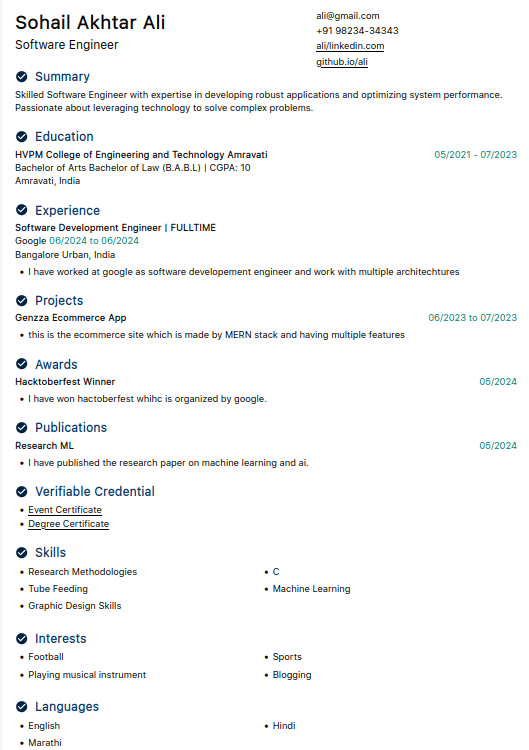
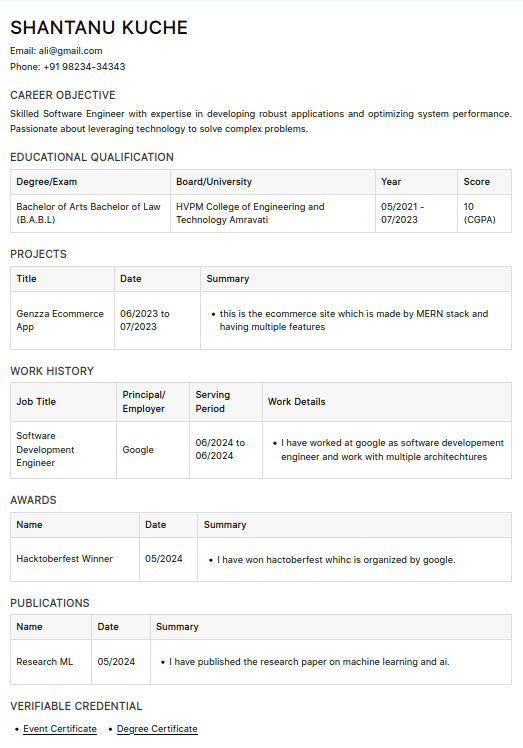
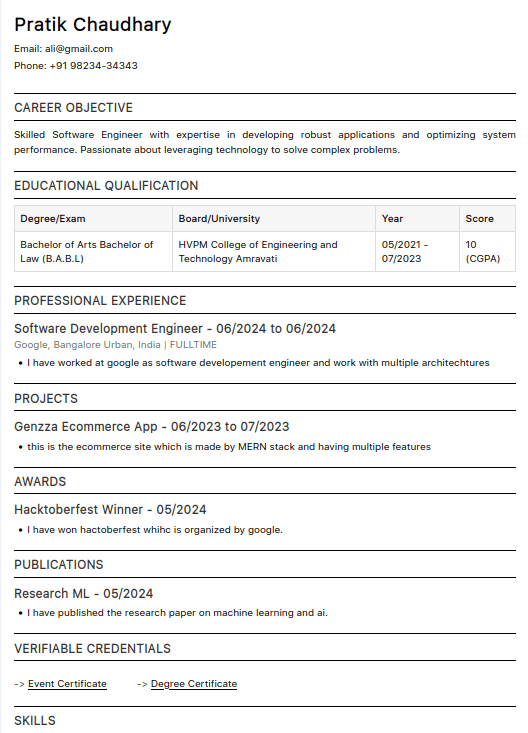
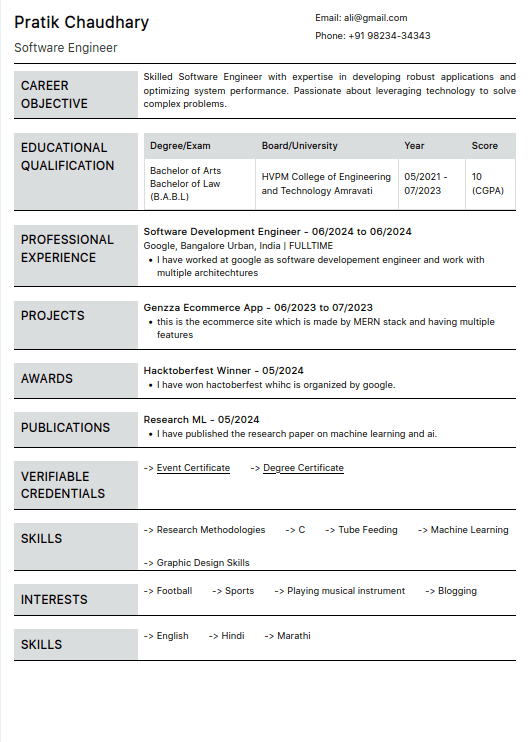












Creating a resume that stands out is crucial in today’s competitive job market. Your resume serves as your first impression to potential employers, and it needs to effectively showcase your skills, experience, and achievements. One of the best ways to craft a compelling resume is by looking at examples that align with your career goals. This article provides a comprehensive guide to resume examples across various industries and career levels, helping you create a resume that gets noticed.
Creating a resume that stands out is crucial in today’s competitive job market. Your resume serves as your first impression to potential employers, and it needs to effectively showcase your skills, experience, and achievements. One of the best ways to craft a compelling resume is by looking at examples that align with your career goals. This article provides a comprehensive guide to resume examples across various industries and career levels, helping you create a resume that gets noticed.
Creating a resume that stands out is crucial in today’s competitive job market. Your resume serves as your first impression to potential employers, and it needs to effectively showcase your skills, experience, and achievements. One of the best ways to craft a compelling resume is by looking at examples that align with your career goals. This article provides a comprehensive guide to resume examples across various industries and career levels, helping you create a resume that gets noticed.
Why Use Resume Examples?
Using resume examples can be incredibly beneficial when creating your own resume. They provide a clear and practical guide to help you understand how to structure your resume, what information to include, and how to present your skills and experiences effectively. By following proven examples, you can create a resume that is professional, polished, and tailored to the job you’re applying for.
Why Use Resume Examples?
Using resume examples can be incredibly beneficial when creating your own resume. They provide a clear and practical guide to help you understand how to structure your resume, what information to include, and how to present your skills and experiences effectively. By following proven examples, you can create a resume that is professional, polished, and tailored to the job you’re applying for.
Why Use Resume Examples?
Using resume examples can be incredibly beneficial when creating your own resume. They provide a clear and practical guide to help you understand how to structure your resume, what information to include, and how to present your skills and experiences effectively. By following proven examples, you can create a resume that is professional, polished, and tailored to the job you’re applying for.
Main Benefits of Using Resume Examples:
Inspiration and Guidance:
Resume examples offer inspiration on how to structure your resume, what to include, and how to present your experiences. They provide a visual reference that can help you understand what a polished and professional resume looks like.
Tailored to Different Industries:
Whether you’re in finance, marketing, healthcare, or IT, there are resume examples tailored to your specific industry. Each field has its own set of expectations, and these examples help ensure that your resume meets industry standards.
Catered to Career Levels:
Resume examples are available for all career stages, from entry-level to executive positions. They illustrate how to highlight relevant experience and skills at each stage of your career, ensuring your resume is appropriate for your level of expertise.
Showcases Best Practices:
High-quality resume examples demonstrate best practices in resume writing, including the use of action verbs, quantifying achievements, and maintaining a clean, readable format. These examples help you avoid common mistakes and ensure your resume is polished and professional.
Main Benefits of Using Resume Examples:
Inspiration and Guidance:
Resume examples offer inspiration on how to structure your resume, what to include, and how to present your experiences. They provide a visual reference that can help you understand what a polished and professional resume looks like.
Tailored to Different Industries:
Whether you’re in finance, marketing, healthcare, or IT, there are resume examples tailored to your specific industry. Each field has its own set of expectations, and these examples help ensure that your resume meets industry standards.
Catered to Career Levels:
Resume examples are available for all career stages, from entry-level to executive positions. They illustrate how to highlight relevant experience and skills at each stage of your career, ensuring your resume is appropriate for your level of expertise.
Showcases Best Practices:
High-quality resume examples demonstrate best practices in resume writing, including the use of action verbs, quantifying achievements, and maintaining a clean, readable format. These examples help you avoid common mistakes and ensure your resume is polished and professional.
Main Benefits of Using Resume Examples:
Inspiration and Guidance:
Resume examples offer inspiration on how to structure your resume, what to include, and how to present your experiences. They provide a visual reference that can help you understand what a polished and professional resume looks like.
Tailored to Different Industries:
Whether you’re in finance, marketing, healthcare, or IT, there are resume examples tailored to your specific industry. Each field has its own set of expectations, and these examples help ensure that your resume meets industry standards.
Catered to Career Levels:
Resume examples are available for all career stages, from entry-level to executive positions. They illustrate how to highlight relevant experience and skills at each stage of your career, ensuring your resume is appropriate for your level of expertise.
Showcases Best Practices:
High-quality resume examples demonstrate best practices in resume writing, including the use of action verbs, quantifying achievements, and maintaining a clean, readable format. These examples help you avoid common mistakes and ensure your resume is polished and professional.
Types of Resume Examples
Resume examples come in various types, each tailored to different career stages, industries, and job roles. Understanding these types can help you choose the right format and style for your resume, ensuring it effectively highlights your qualifications and aligns with industry standards. Here’s a look at the main types of resume examples:
Entry-Level Resume Examples:
For those just starting their careers, entry-level resume examples are invaluable. They demonstrate how to highlight education, internships, volunteer work, and transferable skills. These examples help you present yourself as a strong candidate, even with limited work experience.
Key Features:
Focus on education and relevant coursework.
Highlight internships and volunteer experiences.
Emphasize transferable skills, such as communication and teamwork.
Use a simple, clean format to ensure readability.
Professional Resume Examples:
If you’re a mid-career professional, these resume examples show how to present your work history, achievements, and skills in a way that highlights your expertise and career progression. They provide insight into how to balance detailed job descriptions with concise, impactful language.
Key Features:
Detailed work experience section with quantifiable achievements.
Professional summary or objective statement that reflects your career goals.
Skills section tailored to the job you’re applying for.
Clean, professional design with a focus on readability.
Executive Resume Examples:
For those aiming for senior management or executive positions, these examples demonstrate how to showcase leadership experience, strategic thinking, and significant achievements. They focus on the impact you’ve made in previous roles and your ability to drive success at the highest levels.
Key Features:
Strong executive summary highlighting leadership skills and achievements.
Focus on accomplishments that demonstrate your impact on the organization.
Emphasis on strategic thinking, decision-making, and team leadership.
Professional and sophisticated design, often with a more detailed format.
Industry-Specific Resume Examples:
Resume examples tailored to specific industries ensure that your resume meets the unique expectations of your field. Whether you’re in technology, healthcare, education, or another industry, these examples show how to emphasize the skills and experiences that matter most.
Key Features:
Industry-specific jargon and keywords that align with job descriptions.
Focus on relevant skills, certifications, and experiences.
Examples of how to present technical skills or specialized knowledge.
Tailored design elements that reflect the industry’s standards.
Types of Resume Examples
Resume examples come in various types, each tailored to different career stages, industries, and job roles. Understanding these types can help you choose the right format and style for your resume, ensuring it effectively highlights your qualifications and aligns with industry standards. Here’s a look at the main types of resume examples:
Entry-Level Resume Examples:
For those just starting their careers, entry-level resume examples are invaluable. They demonstrate how to highlight education, internships, volunteer work, and transferable skills. These examples help you present yourself as a strong candidate, even with limited work experience.
Key Features:
Focus on education and relevant coursework.
Highlight internships and volunteer experiences.
Emphasize transferable skills, such as communication and teamwork.
Use a simple, clean format to ensure readability.
Professional Resume Examples:
If you’re a mid-career professional, these resume examples show how to present your work history, achievements, and skills in a way that highlights your expertise and career progression. They provide insight into how to balance detailed job descriptions with concise, impactful language.
Key Features:
Detailed work experience section with quantifiable achievements.
Professional summary or objective statement that reflects your career goals.
Skills section tailored to the job you’re applying for.
Clean, professional design with a focus on readability.
Executive Resume Examples:
For those aiming for senior management or executive positions, these examples demonstrate how to showcase leadership experience, strategic thinking, and significant achievements. They focus on the impact you’ve made in previous roles and your ability to drive success at the highest levels.
Key Features:
Strong executive summary highlighting leadership skills and achievements.
Focus on accomplishments that demonstrate your impact on the organization.
Emphasis on strategic thinking, decision-making, and team leadership.
Professional and sophisticated design, often with a more detailed format.
Industry-Specific Resume Examples:
Resume examples tailored to specific industries ensure that your resume meets the unique expectations of your field. Whether you’re in technology, healthcare, education, or another industry, these examples show how to emphasize the skills and experiences that matter most.
Key Features:
Industry-specific jargon and keywords that align with job descriptions.
Focus on relevant skills, certifications, and experiences.
Examples of how to present technical skills or specialized knowledge.
Tailored design elements that reflect the industry’s standards.
Types of Resume Examples
Resume examples come in various types, each tailored to different career stages, industries, and job roles. Understanding these types can help you choose the right format and style for your resume, ensuring it effectively highlights your qualifications and aligns with industry standards. Here’s a look at the main types of resume examples:
Entry-Level Resume Examples:
For those just starting their careers, entry-level resume examples are invaluable. They demonstrate how to highlight education, internships, volunteer work, and transferable skills. These examples help you present yourself as a strong candidate, even with limited work experience.
Key Features:
Focus on education and relevant coursework.
Highlight internships and volunteer experiences.
Emphasize transferable skills, such as communication and teamwork.
Use a simple, clean format to ensure readability.
Professional Resume Examples:
If you’re a mid-career professional, these resume examples show how to present your work history, achievements, and skills in a way that highlights your expertise and career progression. They provide insight into how to balance detailed job descriptions with concise, impactful language.
Key Features:
Detailed work experience section with quantifiable achievements.
Professional summary or objective statement that reflects your career goals.
Skills section tailored to the job you’re applying for.
Clean, professional design with a focus on readability.
Executive Resume Examples:
For those aiming for senior management or executive positions, these examples demonstrate how to showcase leadership experience, strategic thinking, and significant achievements. They focus on the impact you’ve made in previous roles and your ability to drive success at the highest levels.
Key Features:
Strong executive summary highlighting leadership skills and achievements.
Focus on accomplishments that demonstrate your impact on the organization.
Emphasis on strategic thinking, decision-making, and team leadership.
Professional and sophisticated design, often with a more detailed format.
Industry-Specific Resume Examples:
Resume examples tailored to specific industries ensure that your resume meets the unique expectations of your field. Whether you’re in technology, healthcare, education, or another industry, these examples show how to emphasize the skills and experiences that matter most.
Key Features:
Industry-specific jargon and keywords that align with job descriptions.
Focus on relevant skills, certifications, and experiences.
Examples of how to present technical skills or specialized knowledge.
Tailored design elements that reflect the industry’s standards.
How to Use Resume Examples Effectively?
Resume examples are a valuable resource, but to get the most out of them, it's important to use them strategically. By understanding how to adapt and customize these examples, you can create a resume that not only follows best practices but also reflects your unique qualifications and strengths. Here's how to use resume examples effectively:
Customize for Your Needs:
While resume examples provide a great starting point, it’s essential to customize them to reflect your unique experiences and skills. Use the examples as a guide, but make sure your resume is personalized and tailored to the specific job you’re applying for.
Incorporate Keywords:
Many companies use Applicant Tracking Systems (ATS) to screen resumes. Incorporate relevant keywords from the job description into your resume to increase the chances of passing through these systems. Resume examples can help you identify which keywords are commonly used in your industry.
Focus on Achievements:
When using resume examples, pay attention to how achievements are highlighted. Focus on quantifiable accomplishments rather than just listing job duties. Use numbers, percentages, and specific outcomes to demonstrate your impact.
Maintain Readability:
Ensure that your resume is easy to read by choosing a clean layout and using bullet points to break up text. Avoid dense paragraphs and use white space effectively. Resume examples often demonstrate the balance between providing detailed information and maintaining readability.
Proofread and Edit:
Even with the help of resume examples, it’s crucial to proofread your resume thoroughly. Look for any typos, grammatical errors, or inconsistencies. A polished resume reflects attention to detail, which is a quality that employers highly value.
How to Use Resume Examples Effectively?
Resume examples are a valuable resource, but to get the most out of them, it's important to use them strategically. By understanding how to adapt and customize these examples, you can create a resume that not only follows best practices but also reflects your unique qualifications and strengths. Here's how to use resume examples effectively:
Customize for Your Needs:
While resume examples provide a great starting point, it’s essential to customize them to reflect your unique experiences and skills. Use the examples as a guide, but make sure your resume is personalized and tailored to the specific job you’re applying for.
Incorporate Keywords:
Many companies use Applicant Tracking Systems (ATS) to screen resumes. Incorporate relevant keywords from the job description into your resume to increase the chances of passing through these systems. Resume examples can help you identify which keywords are commonly used in your industry.
Focus on Achievements:
When using resume examples, pay attention to how achievements are highlighted. Focus on quantifiable accomplishments rather than just listing job duties. Use numbers, percentages, and specific outcomes to demonstrate your impact.
Maintain Readability:
Ensure that your resume is easy to read by choosing a clean layout and using bullet points to break up text. Avoid dense paragraphs and use white space effectively. Resume examples often demonstrate the balance between providing detailed information and maintaining readability.
Proofread and Edit:
Even with the help of resume examples, it’s crucial to proofread your resume thoroughly. Look for any typos, grammatical errors, or inconsistencies. A polished resume reflects attention to detail, which is a quality that employers highly value.
How to Use Resume Examples Effectively?
Resume examples are a valuable resource, but to get the most out of them, it's important to use them strategically. By understanding how to adapt and customize these examples, you can create a resume that not only follows best practices but also reflects your unique qualifications and strengths. Here's how to use resume examples effectively:
Customize for Your Needs:
While resume examples provide a great starting point, it’s essential to customize them to reflect your unique experiences and skills. Use the examples as a guide, but make sure your resume is personalized and tailored to the specific job you’re applying for.
Incorporate Keywords:
Many companies use Applicant Tracking Systems (ATS) to screen resumes. Incorporate relevant keywords from the job description into your resume to increase the chances of passing through these systems. Resume examples can help you identify which keywords are commonly used in your industry.
Focus on Achievements:
When using resume examples, pay attention to how achievements are highlighted. Focus on quantifiable accomplishments rather than just listing job duties. Use numbers, percentages, and specific outcomes to demonstrate your impact.
Maintain Readability:
Ensure that your resume is easy to read by choosing a clean layout and using bullet points to break up text. Avoid dense paragraphs and use white space effectively. Resume examples often demonstrate the balance between providing detailed information and maintaining readability.
Proofread and Edit:
Even with the help of resume examples, it’s crucial to proofread your resume thoroughly. Look for any typos, grammatical errors, or inconsistencies. A polished resume reflects attention to detail, which is a quality that employers highly value.
Popular Resume Examples for Different Careers
Technology Resume Examples:
Examples for software engineers, IT specialists, data analysts, and more.
Focus on technical skills, programming languages, and relevant projects.
Healthcare Resume Examples:
Examples for nurses, medical assistants, healthcare administrators, and more.
Emphasize certifications, patient care experience, and healthcare technology skills.
Marketing Resume Examples:
Examples for digital marketers, content creators, social media managers, and more.
Highlight creativity, campaign success, and analytical skills.
Finance Resume Examples:
Examples for accountants, financial analysts, auditors, and more.
Focus on financial modeling, budgeting, and financial reporting.
Education Resume Examples:
Examples for teachers, educational administrators, and curriculum developers.
Emphasize teaching experience, classroom management, and curriculum development.
Popular Resume Examples for Different Careers
Technology Resume Examples:
Examples for software engineers, IT specialists, data analysts, and more.
Focus on technical skills, programming languages, and relevant projects.
Healthcare Resume Examples:
Examples for nurses, medical assistants, healthcare administrators, and more.
Emphasize certifications, patient care experience, and healthcare technology skills.
Marketing Resume Examples:
Examples for digital marketers, content creators, social media managers, and more.
Highlight creativity, campaign success, and analytical skills.
Finance Resume Examples:
Examples for accountants, financial analysts, auditors, and more.
Focus on financial modeling, budgeting, and financial reporting.
Education Resume Examples:
Examples for teachers, educational administrators, and curriculum developers.
Emphasize teaching experience, classroom management, and curriculum development.
Popular Resume Examples for Different Careers
Technology Resume Examples:
Examples for software engineers, IT specialists, data analysts, and more.
Focus on technical skills, programming languages, and relevant projects.
Healthcare Resume Examples:
Examples for nurses, medical assistants, healthcare administrators, and more.
Emphasize certifications, patient care experience, and healthcare technology skills.
Marketing Resume Examples:
Examples for digital marketers, content creators, social media managers, and more.
Highlight creativity, campaign success, and analytical skills.
Finance Resume Examples:
Examples for accountants, financial analysts, auditors, and more.
Focus on financial modeling, budgeting, and financial reporting.
Education Resume Examples:
Examples for teachers, educational administrators, and curriculum developers.
Emphasize teaching experience, classroom management, and curriculum development.
Resume FAQ
Resume FAQ
Resume FAQ
What is a Resume?
A resume is a formal document that provides an overview of your professional qualifications, including your work experience, education, skills, and achievements. It's typically used to apply for jobs, giving potential employers a snapshot of your background and suitability for a specific role. A well-crafted resume highlights your strengths and is often your first opportunity to make a strong impression.
What is a Resume?
A resume is a formal document that provides an overview of your professional qualifications, including your work experience, education, skills, and achievements. It's typically used to apply for jobs, giving potential employers a snapshot of your background and suitability for a specific role. A well-crafted resume highlights your strengths and is often your first opportunity to make a strong impression.
What is a Resume?
A resume is a formal document that provides an overview of your professional qualifications, including your work experience, education, skills, and achievements. It's typically used to apply for jobs, giving potential employers a snapshot of your background and suitability for a specific role. A well-crafted resume highlights your strengths and is often your first opportunity to make a strong impression.
How do i create my first resume?
A resume is a formal document that provides an overview of your professional qualifications, including your work experience, education, skills, and achievements. It's typically used to apply for jobs, giving potential employers a snapshot of your background and suitability for a specific role. A well-crafted resume highlights your strengths and is often your first opportunity to make a strong impression.
How do i create my first resume?
A resume is a formal document that provides an overview of your professional qualifications, including your work experience, education, skills, and achievements. It's typically used to apply for jobs, giving potential employers a snapshot of your background and suitability for a specific role. A well-crafted resume highlights your strengths and is often your first opportunity to make a strong impression.
How do i create my first resume?
A resume is a formal document that provides an overview of your professional qualifications, including your work experience, education, skills, and achievements. It's typically used to apply for jobs, giving potential employers a snapshot of your background and suitability for a specific role. A well-crafted resume highlights your strengths and is often your first opportunity to make a strong impression.
What should I include in my resume?
Your resume should include your contact information, a professional summary or objective, work experience, education, skills, and any relevant certifications or accomplishments. Tailoring your resume to the job you're applying for can increase your chances of standing out. 2. How long should my resume be?
What should I include in my resume?
Your resume should include your contact information, a professional summary or objective, work experience, education, skills, and any relevant certifications or accomplishments. Tailoring your resume to the job you're applying for can increase your chances of standing out. 2. How long should my resume be?
What should I include in my resume?
Your resume should include your contact information, a professional summary or objective, work experience, education, skills, and any relevant certifications or accomplishments. Tailoring your resume to the job you're applying for can increase your chances of standing out. 2. How long should my resume be?
Should I include a photo on my resume?
The answer is No. Including a photo on your resume is not recommended as it can distract the recruiter HR managers. Most of the companies use Applicant tracking system (ATS) to check the Resume. Graphics should possibly not be scanned by the ATS System. So, do not add any type of images in your resume.
Should I include a photo on my resume?
The answer is No. Including a photo on your resume is not recommended as it can distract the recruiter HR managers. Most of the companies use Applicant tracking system (ATS) to check the Resume. Graphics should possibly not be scanned by the ATS System. So, do not add any type of images in your resume.
Should I include a photo on my resume?
The answer is No. Including a photo on your resume is not recommended as it can distract the recruiter HR managers. Most of the companies use Applicant tracking system (ATS) to check the Resume. Graphics should possibly not be scanned by the ATS System. So, do not add any type of images in your resume.
What's the difference between a resume and a CV?
A resume is a informational document, typically one to two pages, that highlights your relevant work experience, skills, and education. A CV (Curriculum Vitae) is more detailed, often used for academic, research, or international positions, and includes a comprehensive overview of your professional history, publications, and other accomplishments.
What's the difference between a resume and a CV?
A resume is a informational document, typically one to two pages, that highlights your relevant work experience, skills, and education. A CV (Curriculum Vitae) is more detailed, often used for academic, research, or international positions, and includes a comprehensive overview of your professional history, publications, and other accomplishments.
What's the difference between a resume and a CV?
A resume is a informational document, typically one to two pages, that highlights your relevant work experience, skills, and education. A CV (Curriculum Vitae) is more detailed, often used for academic, research, or international positions, and includes a comprehensive overview of your professional history, publications, and other accomplishments.
How often should I update my resume?
You should update your resume regularly, especially after gaining new experience, skills, or certifications. It's a good practice to revisit and revise your resume every six months or whenever you're preparing to apply for a new job.
How often should I update my resume?
You should update your resume regularly, especially after gaining new experience, skills, or certifications. It's a good practice to revisit and revise your resume every six months or whenever you're preparing to apply for a new job.
How often should I update my resume?
You should update your resume regularly, especially after gaining new experience, skills, or certifications. It's a good practice to revisit and revise your resume every six months or whenever you're preparing to apply for a new job.
Build Your Resume
Truresume offers free Resume Templates to help you craft a professional resume quickly and easily.
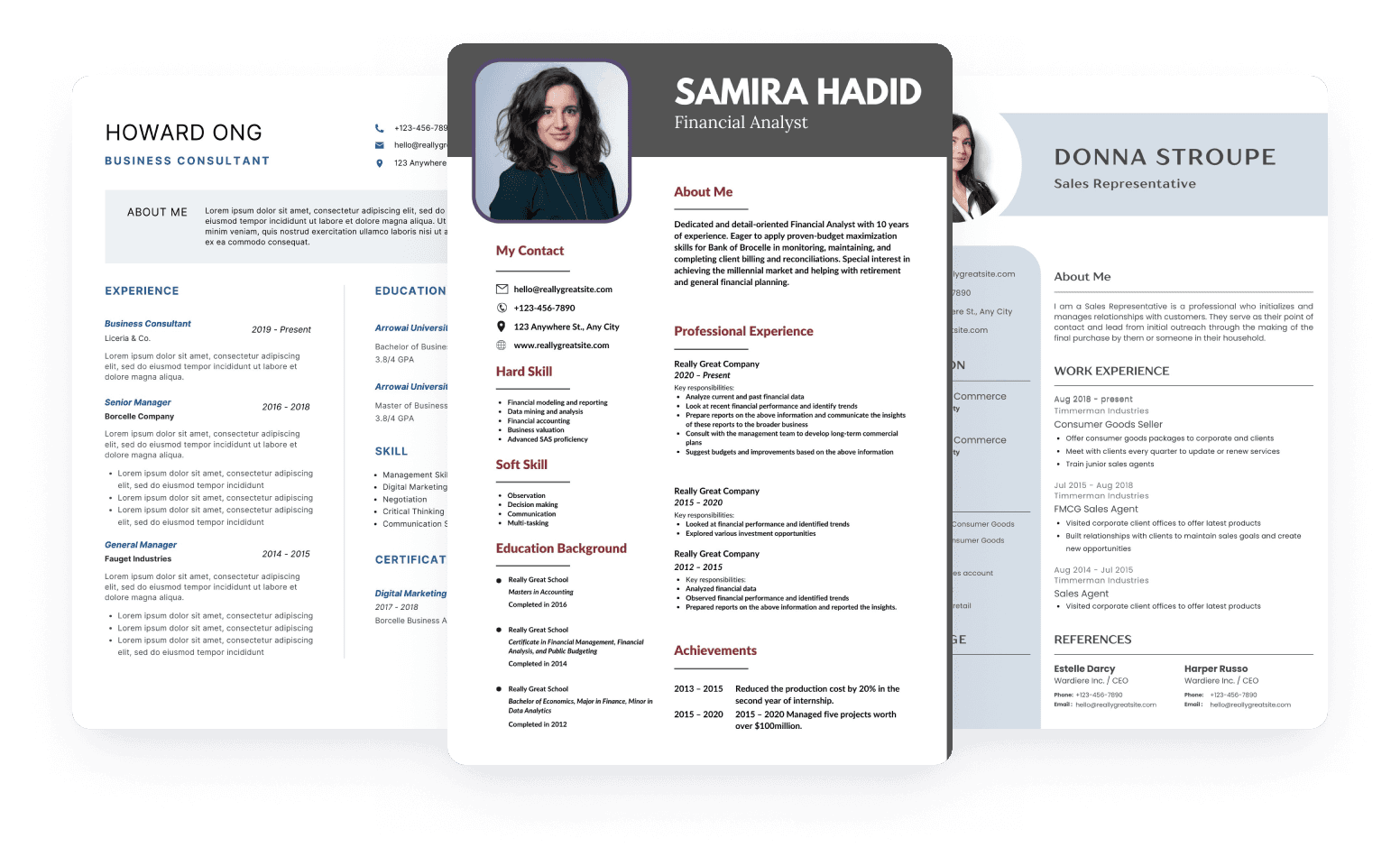
Build Your Resume
Truresume offers free Resume Templates to help you craft a professional resume quickly and easily.

Build Your Resume
Truresume offers free Resume Templates to help you craft a professional resume quickly and easily.

Our Featured Articles

resume
Best Resume Format for Freshers in 2025: Your Ultimate Guide to Getting Noticed
3 Jun 2025

ATS
Why TruResume ATS Friendly Resume Builder Tools Are Best for Resume Building
3 Jun 2025

Resume
Why ATS-Friendly Resumes Are Important to Pass Initial Screening
3 Jun 2025

Resume
What’s the Difference Between CV and Resume?
3 Jun 2025

Resume
How to Write a Resume for Freshers with No Experience
3 Jun 2025

Resume
What to Include or Not in Resume 2025 as a Fresher
3 Jun 2025
Our Featured Articles

resume
Best Resume Format for Freshers in 2025: Your Ultimate Guide to Getting Noticed
3 Jun 2025

ATS
Why TruResume ATS Friendly Resume Builder Tools Are Best for Resume Building
3 Jun 2025

Resume
Why ATS-Friendly Resumes Are Important to Pass Initial Screening
3 Jun 2025

Resume
What’s the Difference Between CV and Resume?
3 Jun 2025
Our Featured Articles

resume
Best Resume Format for Freshers in 2025: Your Ultimate Guide to Getting Noticed
3 Jun 2025

ATS
Why TruResume ATS Friendly Resume Builder Tools Are Best for Resume Building
3 Jun 2025

Resume
Why ATS-Friendly Resumes Are Important to Pass Initial Screening
3 Jun 2025

Resume
What’s the Difference Between CV and Resume?
3 Jun 2025